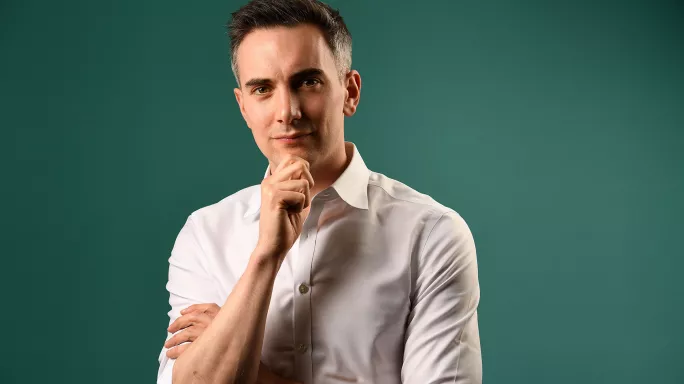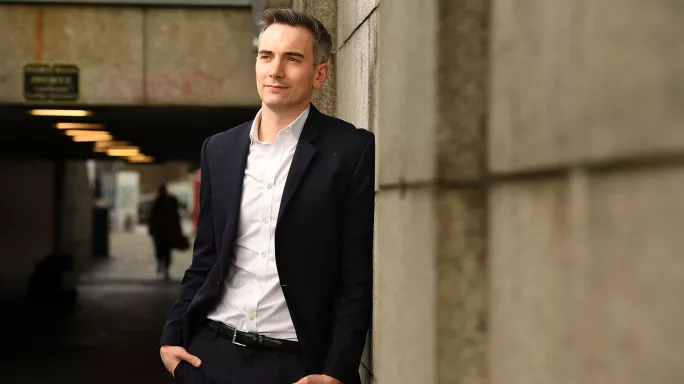- Home
- Meet the ex-Tory adviser who wants Labour to love free schools
Meet the ex-Tory adviser who wants Labour to love free schools

In recent years, Luke Tryl has been one of the most influential yet shadowy presences in England’s schools landscape.
As an adviser first to an education secretary, and then a chief inspector, he has had the ear of two of the most important people in the system - but only behind closed doors.
But now, after two roles as a self-described “back-room boy”, Tryl is stepping into the light, and says he wants to “get his hands dirty” in his new role leading the New Schools Network (NSN).
The controversial free schools charity has been a hot house for some of the leading Conservative figures over the last decade, but now Tryl wants to convince the Labour Party of the merits of the programme.
Escaping ‘Britain’s worst school’
Tryl grew up in Halifax, Yorkshire, with “a typically working-class background”.
He got into the local grammar school, which he says “genuinely changed my life”. As well as pushing all pupils, he recalls its supportive environment.
“I came out at school at 14 and actually, once I came out, I didn’t experience any bullying. I was the first openly gay head boy, and people just saw it as part of the thing,” he recalls.
Tes profile: Carolyn Roberts - chair of Ethical Leadership Commission for heads
Tes profile: Jo Saxton - Mat CEO who thinks Angela Rayner is ‘so cool’
Tes profile: Leora Cruddas - ‘the academies sector is very beaten’
Had he not attended the grammar school, he would have gone to the now-closed Ridings School, at a time when it was notorious as “the worst school in Britain”.
He does not, however, believe the grammar school system as a whole should be expanded.
“Grammar schools worked when we needed to send 10 or 20 per cent of the population to university. That’s just not where we are any more.
“We know that on balance it’s not the story of children from working class backgrounds getting a leg up. It’s middle class families who can afford to tutor their kids that get in, so I don’t think the system works writ large.”
Will it pass the Daily Mail test?
Tryl is “slightly embarrassed” to admit that he joined the Conservative party at the age of 14.
But when he went on to Oxford University - his first impression was that it was “like being in Lord of the Rings” - he avoided the Conservatives.
“At university I didn’t get involved in the university Conservatives really. They had quite a bad reputation, and were much further to the right than I am,” he remembers.

Instead, he channelled his political passions into the Oxford Union debating society, where was elected president in 2007. Just over a decade earlier his future boss Nicky Morgan had stood for the same role, but lost.
Although he has not been a teacher, schools and education have played a large role in Tryl’s subsequent career, whether it be in thinktanks, government or campaign groups.
At the Reform thinktank, he worked on Core Business, a report published in 2009 that became the basis for the English Baccalaureate.
And at the LGBT rights charity Stonewall, his first role was developing its work in primary schools.
“There are increasing numbers of kids with same-sex parents, we know that kids start to realise they are gay probably towards the end of primary school in lots of cases, and we were thinking about how do you do that sensitively in a way that passes the Daily Mail test?
“That’s where we came up with the idea of ‘different families’, the idea that some people have two mums, two dads, one mum, one dad, live with grandparents. It was a soft way of bringing it in which matched kids’ experiences.”
He says that when he left Stonewall, he thought perhaps it was “job done” in terms of LGBT issues in the UK. Now, with parental protests forcing some primary schools in England to halt lessons about same-sex relationships, he is not so sure.
“I do genuinely think that, for the first time, we are at risk of seeing things slip backwards,” he warns.
‘Sir Michael Wilshaw tore my weekends apart’
Tryl joined the DfE in 2014 as special adviser to the new education secretary Nicky Morgan.
After her appointment, a friend called Tryl to suggest that he and Morgan would “really get on”.
“We met for coffee in Portcullis House when she was having a migraine, actually,” Tryl says. “I only discovered subsequently that she hired me without being able to see me, which I have rolled with.
“It just clicked because we have the same brand of very centrist, one-nation Conservatism which we both believe in.”
Morgan had voted against same-sex marriage, something Tryl had been campaigning for at Stonewall, but he says her choice was understandable for a first-term MP receiving a huge postbag on the issue.
“She thought about it and changed her mind. I genuinely wish more politicians would say ‘Look, I looked at this and I got it wrong. I’m sorry.’”
Given that Tryl’s next big job was working with the chief inspector Amanda Spielman as Ofsted’s director of corporate strategy, few people are better placed to discuss the relationship between the two organisations that influence so much of every school’s existence.
There is, he says, “a healthy tension”.
From his DfE days, “there were times I remember at the DfE when [senior Ofsted official] Matthew Coffey would ring me up and say Sir Michael [Wilshaw, Ofsted’s chief inspector] is on his way to the Today programme, and I would just be head in hands. The number of weekends I had that were torn apart by Sir Michael’s latest...”

For the DfE, it would be “immensely frustrating, because Ofsted is such a powerful brand.
“I always used to say to people internally ‘there is no point us trying to go head to head with him because ultimately it’s the nation’s headmaster against a government minister, and I know who is going to win’.”
On the other side of the fence at Ofsted, much of Tryl’s time was spent dealing with the DfE’s concerns about its plans to radically overhaul the school inspection framework.
“Basically, up until January [2019], I guess my final six months in Ofsted were a pretty intensive series of negotiations over the framework, because the secretary of state was entirely right to say ‘why are you doing this, do you need to do this, what are the workload implications?’
“God, it was frustrating at times doing some of the negotiations with them, but I genuinely feel it is better for it, and we got to a stage in January where the secretary of state has given the framework his full support.”
Ofsted inspectors ‘getting good at seeing through charlatans’
So, what about the new framework?
It aims to address concerns that schools have become exam factories, and its shift of emphasis from data to curriculum will mark a big change not just for schools, but for the inspectorate itself.
Is Tryl confident that come September, all Ofsted inspectors will be able to fairly and consistently inspect schools on a very different framework, when the draft is today still out for consultation?
“Yes. Genuinely,” he answers without hesitation, citing evidence he has seen from pilot inspections.
What about concerns that the new framework will reward heads who can talk a good game about their curriculum during the relatively short time the inspectors are in their school?
Tryl responds: “That is a fair challenge, but that was the entire reason we did the third phase of the curriculum research project, which was ‘can you untangle intent from implementation?’ Can you see if this good game that is being talked is actually being implemented? And actually, that showed that it could.
“I think Ofsted inspectors are getting increasingly good at seeing through charlatans and I think as an organisation, particularly under Amanda, they have moved away from the concept of the hero head.”
‘I had a large glass of wine and published it’
Tryl has always been open about his sexuality; telling the world about his mental health was “much, much, much harder”.
In July 2017, he published a blog about his struggles with panic disorder and health anxiety.
“I agonised over it for ages as to whether to do it,” he says now. “I remember at the time talking to friends about it, and they just didn’t get it. ‘You have a panic attack when you get on a Tube? Get over it; just get a grip’.”
In the end, he reasoned that LGBT equality started moving forward when senior figures started coming out, “so I took the plunge, wrote it, had a large glass of wine and published it”.
Afterwards, friends and colleagues opened up about their own experiences, and thanked him for writing about his.
Young people’s mental health needs more investment, he believes.
“I think particularly when people experience issues it is still outrageous, the waiting lists if you want to get cognitive behavioural therapy as a kid.
“A big problem is that because you don’t have the expertise in schools you have got this massive wave of referrals going into Cahms (child and adolescent mental health services), which means Cahms can’t then prioritise.
“I’m not one of those people who say ‘money, money, money’, but I think this is an area where we need money. It needs investment.”
‘It’s good to keep academy trusts on their toes’
Tryl is now into his second week as director of the New Schools Network, and he wants to return the free schools movement to its original vision of parents setting up new schools to meet their community’s needs.
It’s a vision that, while never entirely repudiated by the DfE, has been quietly fading away.
After some high-profile problems among the earlier free schools, most are now set up by experienced multi-academy trusts that have become part of the educational establishment, rather than by buccaneering outsiders trying to shake things up.

Given the problems of many of the early free schools, isn’t it risky to move back to the original concept?
“I don’t think it is,” Tryl says, “because we will always need innovation in the system, because I just think it would be a tragedy if we returned basically to quite an ossified, stale system with lots of MATs just doing the job of local authorities, you had no challenger model, you had no pressure there and you have no innovation.
“I think if anything we have more of a need to get back to that.”
The difference from the early days, he says, is that there is much more infrastructure and experience to help new schools.
“I just think it would be such a shame to move to system where we lost that disruption, innovation, unhappiness with the status quo. Although a lot of the MATs do a good job, it’s also good to keep them on their toes.”
And he sees NSN doing more work with schools that are already open, helping them when they decide to expand.
“There is literally no point in the free school programme if we just create a series of isolated pockets of excellence and do nothing to help with what’s next,” he says.
‘We are not a Tory lobby group’
The New Schools Network has a right-wing reputation.
It was set up as a charity to help deliver the flagship Conservative free schools policy, and Tryl’s predecessors as director have included Rachel Wolf, a Downing Street education adviser to David Cameron, Natalie Evans, now the Tory leader of the House of Lords, and Nick Timothy, who became Theresa May’s joint chief of staff.
Most controversial was Toby Young, the self-described “outspoken Tory” who resigned last year after media attention focused on crude comments he had made on social media.
Is NSN really the independent organisation it has always claimed to be?
Tryl’s answer is clear: “We are not a Tory lobby group. There’s something quite frustrating to me being seen as a Tory organisation.”
In fact, he wants to convert Labour to the cause.
“When you look at the values of the free school movement, they are so similar to the values of the cooperative movement that one of the things I want to do is to work hard to convince the Labour Party that they should be backing new schools.
“The mission here is genuinely social justice. If you talk to our staff, the notion that we are this shady right-wing organisation just isn’t there.”
‘I don’t want to give one of those politician’s answers’
Given the career paths of his predecessors at NSN, it is not unreasonable to wonder if Tryl’s new role is the next step on a road back to Westminster.
He can see parliament from the window of his office on the eighth floor of a tower block on the south bank of the Thames. Does he eventually want to return to the other side of the river, as an MP?
“Look, I don’t want to give one of those politician’s answers to this,” he says, before doing pretty much that.
“Things are just so fluid at the moment that I just have no idea of five or 10 years’ time. I am committed to being here and doing a good job here in the coming years, and that is genuinely my primary focus. What comes after that, I mean genuinely, who knows?”
He’s left the shadows; only time will tell whether Luke Tryl comes to hold even greater influence over the English education system.
CV - Luke Tryl
Education:
1992-1998: Wainstalls Junior and Infant School
1998-2005: Crossley Heath School
2005-2009: Magdalen College, Oxford University (1st Class BA (Hons) Modern History)
2017-2018: Birkbeck, University of London (graduate diploma in quantitative economics, distinction)
Career:
2009-2010: Education Researcher, Reform
2010-2011: Education officer, Stonewall
2011-2012: Account Manager, Tetra Strategy
2012-2014: Stonewall, senior education officer, then head of education
2014-2016: Special advisor to education secretary Nicky Morgan
2016-2017: Interim Director, Public Policy Projects
2017-2019: Director of Corporate Strategy, Ofsted
2019-present: Director, New Schools Network
Keep reading for just £1 per month
You've reached your limit of free articles this month. Subscribe for £1 per month for three months and get:
- Unlimited access to all Tes magazine content
- Exclusive subscriber-only stories
- Award-winning email newsletters



